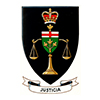Jurisdiction of the Court
The Ontario Superior Court of Justice sits in 52 locations across Ontario and has jurisdiction over matters in five main areas.
Civil Jurisdiction
The Court hears all civil proceedings in Ontario, including corporate and commercial matters, employment matters, personal injury, bankruptcy and insolvency cases, and litigation involving wills and estates. The Civil justice system is in place to ensure that individuals can hold others accountable for wrongdoing and its role is critical to the social and economic stability of our society.
Family Jurisdiction
Family law cases are heard at all Superior Court locations across the province. However, the federal and provincial laws that apply to family law also determine which level of court handles specific family law issues.
For instance, the Superior Court of Justice has the sole jurisdiction to hear cases involving divorce, family property, and the matrimonial home, while child protection and adoption cases must be heard in the Ontario Court of Justice. Both courts hear cases involving parenting, financial support for spouses and children and urgent safety issues.
Family Court Branch of the Superior Court of Justice
In 25 locations across Ontario, this split jurisdiction has been consolidated into a single court known as the Family Court. This specialized court, created by the Courts of Justice Act is a branch of the Superior Court. At any of the 25 Family Court sites Barrie / Belleville / Bracebridge / Brockville / Cayuga / Cobourg / Cornwall / Hamilton / Kingston / Kitchener / Lindsay / London / L'Orignal / Napanee / Newmarket / Oshawa / Ottawa / Peterborough / Pembroke / Perth / Picton / St. Catharines / St. Thomas / Simcoe / Welland , all family law disputes can be addressed within this unified court, including divorce, family property, the matrimonial home, parenting, child and spousal support, safety issues, child protection, and adoption.
Criminal Jurisdiction
The Court has the power to try any indictable offence under the Criminal Code and other federal statutes, such as the Controlled Drugs and Substances Act. However, the Court generally tries only the most serious offences. These include murder, manslaughter, serious violent offences such as aggravated assault and sexual assault, firearm-related offences, robberies, home invasions, criminal organization offences, and drug trafficking, or conspiracy to commit one of these offences. An individual accused of these offences is tried by a judge of the Court sitting either with or without a jury.
Divisional Court Jurisdiction
The Divisional Court is an appellate branch of the Superior Court of Justice.
The Divisional Court hears statutory appeals from administrative tribunals and is the primary forum for judicial review of government action in Ontario. The Divisional Court also has some jurisdiction regarding civil and family appeals.
Every judge of the Superior Court of Justice is also a judge of the Divisional Court. Appeals and applications to the Divisional Court are generally heard in the judicial region where the matter originally arose.
Small Claims Court Jurisdiction
The Small Claims Court hears matters involving disputes for civil claims valued up to $35,000. Known as the “People’s Court”, it provides an efficient and cost-effective forum for Ontarians to bring or defend civil claims quicker and at less expense than in the Superior Court of Justice.
